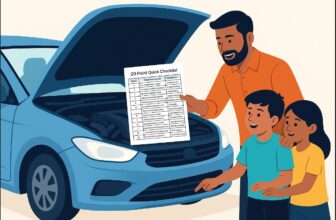Owning a car in India is very different from owning one abroad. Here, your vehicle isn’t just a mode of transport; it’s your daily companion through traffic jams, monsoon floods, summer heat, and highways where service stations may be hundreds of kilometers apart. At the same time, rules like FASTag, PUC checks, and stricter fines make it essential to stay compliant.
Many car owners focus only on driving but overlook basics that affect safety, running costs, and even legality. Missing a PUC slip can invite fines, ignoring tyre pressure reduces mileage, and forgetting insurance renewals can turn a minor accident into a financial burden.
This listicle brings together 25 essentials every car owner in India should know, from legal requirements and maintenance habits to smarter driving practices and cost-saving measures, so you can keep your car road-ready, avoid surprises, and drive with confidence.
Staying Road-Legal: Documents and Rules Every Car Owner in India Must Follow
1. Registration Certificate (RC) Validity
A private car’s RC is valid for 15 years, after which renewal is needed every 5 years. Driving with an expired RC can result in hefty fines or even vehicle seizure. Delhi NCR is stricter, diesel cars are only allowed up to 10 years, petrol cars 15 years, regardless of RC.
2. Mandatory Insurance
Third-party liability insurance is legally compulsory, but it only covers damage to others. A comprehensive policy with add-ons like zero-depreciation, engine protection, and roadside assistance is recommended, especially in accident-prone urban traffic.
3. Pollution Under Control (PUC) Certificate
Every car must have a valid PUC, checked regularly at traffic stops and toll booths. In Delhi, random checks are common due to strict pollution control. New cars usually need a check after one year, then every 6 months.
4. FASTag Compliance
Since 2021, FASTag has been mandatory at most toll plazas. Cars without it are charged double toll. Linking it to UPI or bank apps avoids balance issues on highways.
5. Traffic Fines and Penalties
The Motor Vehicles (Amendment) Act increased fines significantly, ₹1,000 for not wearing a seatbelt, ₹10,000 for drunk driving. Awareness helps avoid unnecessary penalties.
Keeping Your Car Road-Ready in Indian Conditions
6. Engine Oil and Service Intervals
Petrol cars usually require servicing every 10,000 km, while diesel cars often need it at 7,500 km. Skipping oil changes risks severe engine damage. For example, Hyundai and Maruti service centers flag delayed servicing as a reason to deny warranty claims.
7. Tyre Pressure and Rotation
Incorrect tyre pressure reduces mileage and increases accident risk. In India, you should check every 2 weeks due to temperature and road variations. Tyre rotation every 8,000-10,000 km ensures even wear.
8. Battery Health in Indian Heat
Car batteries last 3-5 years on average. In Indian summers, especially in Rajasthan and Gujarat, heat shortens lifespan. A weak battery often fails suddenly, so signs like slow cranking shouldn’t be ignored.
9. Brake Pads and Fluid
Indian stop-and-go traffic wears pads quickly. Brake fluid should be changed every 2 years. Many Maruti and Honda users report pad replacements needed as early as 25,000 km due to city traffic.
10. Coolant and Radiator Check
Coolant prevents overheating, a common problem during summer drives on highways. Low coolant levels can damage the engine. Regular checks every 6 months help avoid this.
11. AC Filter Cleaning
Dusty Indian cities like Delhi or Pune clog cabin filters quickly, reducing AC efficiency. Cleaning or replacing every 10,000 km ensures good airflow and prevents foul smell.
12. Wiper Blades and Washer Fluid
In monsoon-heavy regions like Kerala or Mumbai, poor wipers directly affect visibility. Replace them once a year before rains. Always use washer fluid instead of plain water to prevent clogging.
Smarter and Safer Driving Habits for Indian Roads
13. Understanding Dashboard Warning Lights
Many car owners ignore warning lights until the car stops working. The check engine light, ABS, and oil pressure warnings should never be overlooked. Even budget cars like Tata Tiago or Maruti Swift have clear indicators that drivers must learn.
14. Correct Use of Lights
High-beam misuse is a serious issue on Indian highways. Use high beams only on empty stretches. Fog lamps are for fog, not city driving, misuse dazzles other drivers.
15. Safe Parking Habits
Unauthorized parking in metros can result in fines or towing. Always use the handbrake on slopes, and add wheel stoppers if available. In hilly areas like Himachal, improper parking often leads to accidents.
16. Fuel Type and Octane Knowledge
Filling petrol in a diesel car (or vice versa) is an expensive mistake. Turbo-petrol cars like Hyundai Creta or Skoda Slavia perform better on higher octane (91-95). Misfuelling is common at busy Indian pumps, so double-check before filling.
17. Emergency Kit
Every car should carry:
- Torch
- First-aid kit
- Fire extinguisher
- Tow rope
- Jumper cables
On highways like Delhi-Jaipur or Bangalore-Chennai, an emergency kit can be the difference between being stranded or continuing your journey.
18. Child Seat Awareness
Child seats are not common in India, but they’re critical for safety. Seatbelts do not protect children adequately. Brands like Chicco and R for Rabbit offer affordable options now available in Indian markets.
19. Airbags and ABS Awareness
Many Indian buyers still don’t know how airbags and ABS function. Airbags require seatbelts to be effective, while ABS prevents skidding but doesn’t reduce stopping distance on all surfaces. Knowing their limits improves safety.
Cutting Costs and Protecting Value as a Car Owner in India
20. Fuel Efficiency Tracking
Fuel prices in India fluctuate frequently. Tracking mileage helps detect early problems, for example, sudden drops may indicate tyre, fuel, or engine issues. Apps like Fuelio are popular among Indian car owners.
21. Road Tax and State Transfer Rules
Cars registered in one state can face fines if used long-term in another. For example, a Delhi-registered car in Bangalore can be penalized unless road tax is paid again. Always check rules before relocating.
22. Resale Value Factors
Brands like Maruti Suzuki and Toyota have stronger resale due to cheaper maintenance and widespread service networks. Premium brands like Skoda, VW, or Renault depreciate faster. Accident history and service records significantly affect resale.
23. Extended Warranty and AMC
Extended warranties and annual maintenance contracts (AMC) are worth considering in India, where fuel adulteration and poor roads cause unexpected issues. Hyundai, Maruti, and Tata offer AMC packages at reasonable costs.
24. Tyre Insurance and Roadside Assistance
Tyre damage is common due to potholes and speed breakers. Some insurers now offer tyre protection add-ons. Roadside assistance services from OEMs or third parties like MyTVS are helpful in remote areas.
25. DIY Basics Every Owner Should Know
Changing a flat tyre, topping up oil, and jump-starting a dead battery are basic skills every car owner should learn. On highways like NH44 (India’s longest), roadside help may take hours. These skills save both time and money.
Smarter Car Ownership – Preparedness Overcomes Challenges
Cars in India face harsher realities than in many other countries, extreme summers, unpredictable monsoons, dense traffic, and stricter regulations. By knowing these 25 essentials, you protect your investment, avoid fines, and ensure your family’s safety.
Smarter car ownership isn’t about adding luxury features; it’s about awareness, preparedness, and responsible driving.





